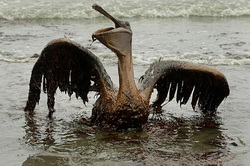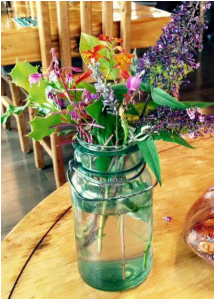
I was at the Hibiscus Bed and Breakfast in Grayton Beach, Florida just a few weeks after the spill, and witnessed first hand how this event hurt the communities. I saw sadness, fear, and anger, and heard worries about how the region could economically survive the assault on its primary sources of income - tourism and recreation. Each day, citizens walked the beach to monitor the status of the water and shore, and reported back to community leaders who were making difficult decisions about how to respond.
What is the situation today? Research cited recently in the New England Journal of Medicine indicates that, while the long-term effects of the oil spill on physical health of the human residents of the Gulf Coast are uncertain, there is clear evidence of negative effects on the residents' economic, mental, and social well-being. There is also clear evidence from a variety of sources that the damage to the region's ecosystems is vast.
Also in the last year - floods, droughts, AND wildfires in Australia, the earthquake-tsunami-nuclear plant disaster in Japan, and floods and landslides following a cyclone in New Zealand - all related to natural disasters and extreme weather. Topic for another day - how has climate change and global warming affected the frequency and severity of extreme weather events? There is a connection. More directly related to human choice - ongoing mountain-top removal and related air and water contamination - and negative health outcomes - in West Virginia. These are just a few of thousands of environmental situations and events that put health and well-being at risk.
What rays of hope have we seen in the last year? I look for rays of hope each day when I read the news, and I do find them, midst the darkness. What shines most brightly for me are reports of the voices and actions of ordinary citizens and a few government agencies in protest against destruction to the environment and in support of healing and protection of the earth. There are many many examples of this - here are just a few:
- Possible contamination of water by drilling for natural gas is a BIG issue in western PA -- and just last Tuesday in Pittsburgh, over 700 citizens turned out for a public forum to discuss the Marcellus Shale project - both to educate themselves and to speak their concerns. That is 700!
- In related news, the PA Department of Environmental Protection asked the state's natural gas drillers to stop delivering contaminated water to water treatment plants, setting a May 19 deadline - don't know yet what will happen if the drillers don't comply, but it is a start.
- Activists in Chicago occupied a local coal plant, protesting its pollution of nearby residences, restaurants, shops, and schools.
- In West Virginia, a march on Blair Mountain is planned for June 5-11, 2011, to demand an end to coal-mining via mountain-top removal, a strengthening of labor rights, and a transition to a sustainable economy.
We ordinary citizens are beginning to really understand that everything is connected, that damage to the earth affects human health and well-being in addition to the ecosystem, and that humans can make better choices in the interests of our grandchildren's futures.


 RSS Feed
RSS Feed
